
By Jen Cardone | The Duquesne Duke
Instructional technology associate professor Misook Heo has been selected as a Fulbright Scholar to research South Korean Internet behavior on collective intelligence sites.
She will travel and conduct her research from June 1 to Aug. 31 at Pusan National University, a prestigious educational facility in South Korea.
The J. William Fulbright Foreign Scholarship Board was established by Congress and oversees global educational exchanges for students, scholars, teachers, professionals, scientists and artists.
While abroad, Heo said she plans to conduct research and establish a “strong relationship” with PNU.
Heo already has a relationship with them, but she wants to enforce it to retain it in the future.
“Research synergy is important around the world as a trend for international collaboration,” she said.
Heo said she will utilize this relationship to continue her research after she returns to the States.
Her research will be conducted on collective intelligence websites, which are where people voluntarily contribute information to build a common knowledge base. Common sites in South Korea are Naver Jisik-in, which is similar to the United States popular Ask.com. Another is Daum Cafe, which is a community forum to allow for active collaboration.
According to Heo, at least three quarters of Koreans have participated in at least one of the two.
In Korea, information has grown dramatically, she said.
“Per capita, high speed Internet is over 100 percent,” Heo said. “Everybody uses it and they’re really willing to help each other.”
No one is participating on Wikipedia because it can be overridden, so eventually what someone wrote can be changed without giving them any credit.
“My research won’t be so different [from others], but my focus starts from acceptance of difference,” Heo said. “They are different and don’t want to participate in Wikipedia knowledge sharing. How can we change that?”
One of her ideas is to provide visual representation, such as a graph, so participants can see their contribution to the conversation. This will be accessible in the website history although it may not appear in the main shared information. Even though the individual’s writing may have disappeared, the system recognizes the input from the contributor.
“I can’t guarantee that it will work, but who knows? That’s what I’m interested in [discovering],” she said.
University of Pittsburgh information science and technology associate Mike Spring, who has known Heo for more than 20 years, said he recommended Heo to the Fulbright office because she has an “effervescent personality” and will work “as an ongoing ambassador for the U.S.”
“In a sense, it is a long-term commitment and you want the best people. She is one of those people,” Spring said.



